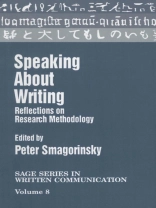This is not a ′how-to-do′ book; it is a ′why-to-do′ book. What is powerful about these chapters is that they are theory driven, and they thus allow us as researchers to understand when and why particular methodologies are appropriate for investigating particular problems in particular situations. The book is, therefore, in an important sense, a ′why-you-shouldn′t′ book because the authors deliberate on how the motivating theory for research is tied to the theoretical grounds for choosing a methodology. The authors grasp and reflect on the need for a researcher to fully understand a methodology′s power and its limitations. They urge researchers to consistently pose the questions: Why should I use this method? What does it yield? What lens does it provide for the problem I am investigating? What must I account for in employing it? Speaking About Writing provides not only a range of methodologies to consider for the investigation of writing, but situating them in the context of one another enables the reader to consider the relative merits of each. Above all, the authors stress that research is driven by problems rather than methods, and that premise helps researchers consider what is potentially available through the tools provided by different methodologies.’ –William Smith, University of Pittsburgh Used as a comprehensive text and research tool, Speaking About Writing focuses on the issues involved in the collection, analysis, and interpretation of data. The approach goes beyond mere quantitative/qualitative differences to examine and critique the very underpinnings and assumptions of the distinct methodologies. Distinguished scholars discuss different writing methods–stimulated recall, think-aloud analysis, retrospective analysis, and intervention analysis. Contributors in discourse analysis look at the ways in which individuals interact with other members of the writing community during a more extended writing process–problem discussion, draft feedback and revision, and teacher conferences. Finally, concluding chapters allow for responses from critics to earlier chapters in order to provide clarification and explanation. Speaking About Writing is the perfect text for scholars and students in written communication (composition and english), communication, research methods, and psychology (cognition).
Зміст
Introduction – Peter Smagorinsky
Potential Problems and Problematic Potentials of Using Talk About Writing as Data About Writing Process
PART ONE: THINK-ALOUD PROTOCOL ANALYSIS
Think-Aloud Protocol Analysis – Peter Smagorinsky
Beyond the Black Box
Think-Aloud Protocols, Protocol Analysis, and Research Design – Stephen P Witte and Roger D Cherry
An Exploration of the Influence of Writing Tasks on Writing Processes
Substance and Romance in Analyzing Think-Aloud Protocols – Robert J Bracewell and Alain Breuleux
Reactivity in Concurrent Think-Aloud Protocols – James F Stratman and Liz Hamp-Lyons
Issues for Research
PART TWO: RETROSPECTIVE ACCOUNTS OF WRITING PROCESS
`Once Upon a Time′ – Stuart Greene and Lorraine Higgins
The Use of Retrospective Accounts in Building Theory in Composition
Using Intervention Protocols to Study the Effects of Instructional Scaffolding on Writing and Learning – Deborah Swanson-Owens and George E Newell
Stimulated Recall in Research on Writing – Anne Di Pardo
An Antidote to `I Don′t Know, It Was Fine′
PART THREE: ANALYSIS OF COLLABORATIVE DISCOURSE
Interpreting and Counting – George Hillocks Jr
Objectivity in Discourse Analysis
Discourse Analysis of Teacher-Student Writing Conferences – Melanie Sperling
Finding the Message in the Medium
What′s All This Talk I Hear? Using Sociolinguistic Analysis to Locate and Map Themes in Teacher/Student Talk About Writing – Elizabeth Hodges
PART FOUR: INTERVIEWS IN THE FIELD
Ethnographic Interviews and Writing Research – Elaine Chin
A Critical Examination of the Methodology
PART FIVE: COUNTERPOINT
Whither Wisdom? – David N Dobrin
Withered Wisdom – Robert J Bracewell
A Reply to Dobrin
Про автора
Peter Smagorinsky is Distinguished Research Professor in the Department of Language and Literacy Education at The University of Georgia, emeritus; and Distinguished Visiting Scholar at the Universidad de Guadalajara, Jalisco, Mexico. From 2012-2020 he served as the faculty advisor to the student-edited Journal of Language and Literacy Education at UGA; and from 1996-2003 he coedited, with Michael W. Smith, Research in the Teaching of English. Recent awards include the 2020 Horace Mann League Outstanding Public Educator Award, 2018 International Federation for the Teaching of English Award, and 2018 Distinguished Scholar recognition by the National Conference on Research in Language and Literacy. His research and teaching take a sociocultural approach to issues of literacy education, literacy teacher education, and related social concerns. These interests have produced two 2020 books from Bloomsbury: Learning to Teach English and Language Arts: A Vygotskian Perspective on Beginning Teachers’ Pedagogical Concept Development; and coedited with Yolanda Gayol and Patricia Rosas, Developing Culturally and Historical Sensitive Teacher Education: Global Lessons from a Literacy Education Program. His interest in neurodiversity has produced two recent edited collections: Creativity and Community among Autism-Spectrum Youth: Creating Positive Social Updrafts through Play and Performance from Palgrave Macmillan; and, coedited with Joe Tobin and Kyunghwa Lee, Dismantling the Disabling Environments of Education: Creating New Cultures and Contexts for Accommodating Difference from Peter Lang.












